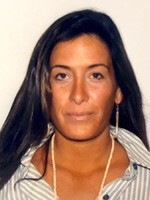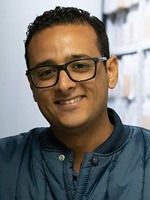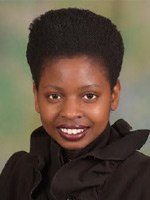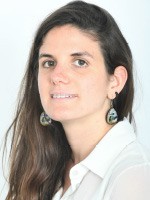2018 Impact Fellows
Sefra Alexandra

Sefra, the Seed Huntress, is an ethnobotanist on a perennial endurance race to preserve the biodiversity of our earth through seed conservation. As a Genebank Impacts Fellow for the Crop Trust, she conducted fieldwork in the South Pacific, highlighting the role global germplasm diversity played in safeguarding the prestige crop Colocasia esculenta. As Directress of Expeditions for Tactivate, she fortifies community seed banks on island nations after natural disasters to ensure food security through seed sovereignty. In her hometown in Connecticut, USA, she is reviving an allium heirloom through the Southport Globe Onion Initiative and seed library to mentor citizens in stewardship through the formation of a local seedshed. Currently, she is pioneering an organic ecoregional pollinator seed pathway to caretake the local entomological ecology. She holds her Teaching Masters in Agroecology from Cornell University, is a member of the Explorer’s Club, and is a WINGS WorldQuest flag carrier.
Donald Villanueva

Donald is currently an Associate Scientist working on impact assessment projects in the Impact Evaluation and Learning (IEL) cluster under Agri-food Policy Platform in the IRRI. While working at IRRI, he was selected as one of the Genebank Impacts Fellows of the Crop Trust in 2018 to evaluate the impact of the IRG on varietal improvement in India. He has an MSc in Economics and BSc in Statistics from the University of the Philippines Los Baños. Before joining the IEL cluster in 2017, he served as an Assistant Scientist under the Gender Research Team of IRRI where he was involved in the data collection, validation, and analysis of gender-related studies in South and Southeast Asia.
Hafid Aberkane

Hafid is currently a PhD Candidate at the Mohammed V University in Rabat, Morocco. His dissertation focuses on the contribution of wheat wild relatives to abiotic stress tolerance and yield stability of durum wheat. He holds an MSc in improvement of agricultural production from the Hassan I University, Morocco. He joined ICARDA’s genebank as a Research Assistant in conservation of genetic resources in 2015. He works in the core activities of the genebank related to regeneration, characterization, and conservation of ICARDA’s germplasm collection, including evaluation and pre-breeding activities that ensure the continuum between conservation and use of genetic resources.
Vanessa Ocampo-Giraldo

Vanessa studied Economics at the Javeriana University in Bogota, Colombia, and completed her MSc in Life Science Economics and Policy at the Technical University of Munich (TUM), Germany. She was part of the Agricultural Production and Resource Economics Chair Group at TUM and worked on a project that focused on nutrition and agriculture in sub-Saharan Africa. She was selected as one of the recipients of the Genebank Impacts Fellowship Program of the Crop Trust in 2018 to document the impacts of maize rematriation from CIMMYT to farmers in Mexico and the use of banana germplasm from Bioversity International in Africa, Asia, and the Pacific. Her professional interests include international agricultural development, sustainable development and food security, econometric impact assessment, and value chain analysis.
Vivian Bernal-Galeano

Vivian is a biologist who is passionate about molecular plant sciences, plant-pathogen interactions and the impacts of plant genetic improvement in the developing world. She is currently a PhD Candidate in the School of Plant and Environmental Sciences and belongs to the Translational Plant Science Program at Virginia Tech, USA. Her research involves the development of tools to study the relationship between parasitic plants and their hosts. She was selected as a recipient of the Crop Trust’s Genebank Impacts Fellowship Program in 2018 to document the impacts of potato germplasm from CIP to farmers in Uganda. Her main areas of interest include the cooperation between science and society with the goal of applying the knowledge from plant science research to enhance food security.
Kavengi Kitonga

Kavengi holds an MA of Economic Policy Management and a Bachelor of Economics from the University of Nairobi, Kenya. In 2019, she started her PhD programme in Agricultural Economics under the African Regional Postgraduate Programme in Insect Sciences and German Academic Exchange Service scholarship programme based in the International Centre of Insect Physiology and Ecology, Kenya. Her research interests include food systems research, development economics, and econometric impact assessment. She has worked as a graduate research intern at CIMMYT’s office in Nairobi from 2016 to 2018. Kavengi was selected as a recipient of the Genebank Impacts Fellowship Program of the Crop Trust in 2018 to document the outcomes from the use of tree germplasm from ICRAF and forage germplasm from the International Livestock Research Institute.
Stefania Sellitti

Stefania studied Economics and Management at the University of Trento, Italy, and completed her Master in Economics at the Universidade Nova de Lisboa, Portugal. Her research interests include development economics, food security, rural development, and impact assessment, with a particular focus on Latin American countries. Since 2016, she has cooperated with the CIAT on research on the impact of Fair Trade coffee certification in Latin America. Stefania was selected as one of the recipients of the Genebank Impacts Fellowship Program3 of the Crop Trust in 2018 to document the contribution of CIAT bean germplasm to farmers in Rwanda.
Other Community Members
Douglas Gollin
Doug Gollin is Professor of Development Economics at the Oxford Department of International Development. His research focuses on economic development and growth, with particular interests in agriculture and structural transformation. He joined Oxford University in 2012 after spending 16 years on the faculty of Williams College in the US, where he retains an affiliation. He is a visiting fellow at the Yale School of Forestry and Environmental Studies. He chairs the Standing Panel on Impact Assessment of the CGIAR. He also works with the International Growth Centre and a number of NGOs involved in policy-oriented research on development. He is currently a Managing Editor of the Journal of African Economies. Dr. Gollin holds an AB degree from Harvard University, an MA from Yale University, and a PhD in Economics from the University of Minnesota.
Nik Tyack
Nicholas Tyack is a PhD candidate in Development Economics at the Graduate Institute of International and Development Studies in Geneva. He holds a master’s degree in Economics from Charles University in Prague, and a bachelor’s degree in Biology from Pomona College in Claremont, California. He is interested in the economic valuation of crop diversity and biodiversity, and he has worked with the Global Crop Diversity Trust and as an environmental consultant in his home city of Boston.
Milan Ščasný
Milan Ščasný is a Senior Research Fellow at the Charles University Environment Center and the Institute of Economic Studies and also at the University of Economics in Prague, Czech Republic. His research activities cover environmental and behavioural economics, consumer demand, and the valuation of non-market goods, particularly for health risks, environmental and health external costs, and impact assessment. He has been involved in more than 30 research projects funded by the Framework Programmes of the European Commission (CECILIE2050, COACCH, GEMCLIME, INHERIT), and recently has been coordinating the Horizon 2020 Marie Sklodowska-Curie Action’s funded RISE project, ‘Global Excellence in Modelling Climate and Energy Policies’. He has collaborated with the Organisation for Economic Co-operation and Development, the European Chemicals Agency, Health Canada, and many ministries and governmental bodies in the Czech Republic. He has published more than 40 articles in journals, which are included in the WoS Thomson Reuters database with a H-index 11.
Michel E. Ghanem
Michel E. Ghanem is currently an Associate Professor of Plant Science at the Mohammed VI Polytechnic University (UM6P) in Morocco. He was the former Programme Leader of the Genetic Resources Program at the Pacific Community (SPC)-LRD in Fiji in 2018–2019. Prior to that, he worked at the International Center for Agricultural Research in the Dry Areas and established the Crop Physiology Group and Laboratory in Rabat (Morocco). His research focuses on the use of genetic resources, agronomy, abiotic stress tolerance (drought, salinity, and heat), root biotechnology, plant phenotyping, and crop modelling. He has a PhD in plant biology from the University of Louvain, Belgium.
Grace Lee Capilit
Grace Lee Capilit is a Lead Specialist in data management at IRRI. She currently manages the rice germplasm database of the International Rice Genebank and collaborates with scientists and researchers on genebank operations, such as seed acquisition, multiplication, characterization, conservation, seed distribution, and information sharing. She has an MS and a BS degree in Statistics from the University of the Philippines Los Baños (UPLB). Before joining the TT Chang Genetic Resources Center in 2009, she was a database manager at the Plant Breeding, Genetics and Biotechnology Division of IRRI from 2000-2008 and also served as a teaching associate at UPLB handling statistical programming, experimental designs, use of statistical packages, and general statistics classes.
Ruaraidh Sackville Hamilton
Ruaraidh Sackville Hamilton has over 40 years of experience in the conservation and use of crop genetic resources, including best practices and workflow management systems for genebank management; database design and data management; statistics, genetics, and genomics; crop wild relatives; pre-breeding; plant breeding; plant ecology; GM biosafety; and international policy on access and benefit-sharing. From 2002 to 2018, he served as the Head of the International Rice Genebank at IRRI in the Philippines. He is an evolutionary biologist and one of the seven award recipients of the Crop Trust Legacy Award in 2018 for his effort and outstanding contribution in the field of plant genetic resources conservation. He has a PhD in plant genetic resources from the University of Cambridge, UK.
Thomas Payne
Thomas Payne manages CIMMYT’s wheat germplasm bank and International Wheat Improvement Network, which serves researchers and breeders from more than 100 countries. His contributions to CIMMYT through the genetic resources and global wheat programmes are wide-ranging, focusing on the conservation, access to, and benefit of sharing the enhanced use of germplasm. His tenure with CIMMYT includes postings in Ethiopia, Mexico, Syria, Turkey and Yugoslavia. He is a recipient of the Crop Trust Legacy Award for his effort and outstanding contribution in the field of plant genetic resources conservation. In 2019, he was awarded the Frank N. Meyer Medal for his contributions to germplasm collection, conservation, and use as well as his dedication and service to humanity through the collection, evaluation or conservation of earth’s genetic resources. He received his PhD in agronomy – plant breeding from the University of Nebraska, USA.
Masahiro Kishii
Masahiro Kishii is a Senior Scientist at the Global Wheat Program of CIMMYT. He currently leads the Wild Crossing Laboratory to make accessible new genes of wheat wild relatives for improving wheat yield potential and biotic/abiotic resistances through the production of synthetic wheat (artificially produced new wheat) and alien chromosome translocation lines. Previously, he was Associate Professor at Yokohama City University and also held the responsibility of maintaining wheat genetic resources lines in the university genebank. He has a BSc from the University of Arizona and a MSc and PhD in wheat cytogenetics from the Kihara Institute for Biological Research, Yokohama City University, Japan.
Ahmed Amri
Ahmed Amri worked as cereal breeder (1980–1999) at the National Institute for Agricultural Research of Morocco (INRA), contributing to the release of 17 barley varieties and 10 Hessian fly resistant wheat varieties. In 1999, he joined ICARDA leading the project that developed a holistic approach for promoting in situ/on-farm conservation of dryland agrobiodiversity. Since 2001, he has successively assumed ICARDA’s representative position in Jordan, Iran, Egypt, and Morocco, and has been the Head of Genetic Resources Unit and Deputy Director for the Biodiversity and Crop Improvement Program from 2008 to 2019. He has published 147 papers and advised 32 students. His expertise is in areas of in situ and ex situ conservation of genetic resources, pre-breeding using interspecific crosses, and crop improvement. His efforts were acknowledged by several countries and institutions, including the Crop Trust Legacy Award. He has a PhD in genetics and crop sciences from Kansas State University, USA.
Carolina Camacho-Villa
Carolina Camacho-Villa is a Specialist in Innovation and Social Inclusion in the Socioeconomics Program at CIMMYT. She has a multidisciplinary background in agronomy, genetic resources conservation, and utilization as well as rural sociology. At CIMMYT, she worked on agricultural innovation projects in Latin American countries such as Mexico, Guatemala, and Bolivia. In recent years, she has been coordinating efforts to promote social inclusion processes within these projects, especially for women, youth, and indigenous persons, who are the ones suffering the most from inequality in Latin America. In addition, she works in collaboration with the CIMMYT Germplasm Bank on maize landrace rematriation projects. She has a PhD in Sociology of Rural Development from Wageningen University in the Netherlands.
Denise E. Costich
Denise E. Costich is a Senior Scientist and Head of the Maize Collection of the CIMMYT Germplasm Bank. Her current research focuses on the conservation of maize landraces through community participation and the implementation of new seed drying technologies in germplasm collections, from large international banks to small community seed reserves. She has a PhD in Biology from the University of Iowa, USA.
Victor A. Vidal Martinez
Victor A. Vidal Martínez is a Researcher at Mexico’s National Institute of Forestry, Crop and Livestock Research (INIFAP), based at the Experimental Station in Santiago Ixcuintla, Nayarit, Mexico. With over 40 years of experience in the development of research and technology transfer activities focused on maize and sorghum, he specializes in breeding, seed technology, agronomy and genetic resources conservation. He worked on pollen production in relation to genotypic and environmental influences in maize in the USA. He is a member of INIFAP’s strong maize breeding and research team which has developed and released 12 competitive commercial maize hybrids in the last 20 years. During the last seven years he has been collaborating with CIMMYT scientists on landrace trait selection, including drought tolerance, and the conservation of landraces as genetic resources. He has a PhD in Agricultural Sciences from the University of Nebraska-Lincoln, USA.
George Norton
George Norton is a Professor at the Department of Agricultural and Applied Economics, Virginia Tech, USA. He has conducted research and extension in more than 35 countries in Latin America, Africa, and Asia and has advised more than 70 graduate students in his research programme. Dr. Norton’s research develops and applies methods for evaluating social and economic impacts of agricultural technologies and policies for assessing the economic benefits of integrated pest management programmes and for setting agricultural research priorities. He has worked with several national and international agricultural research institutions in the areas of international development and trade, impact assessment, agricultural production economics, and resource and environmental economics.
David Ellis
David Ellis has over 30 years of genetic resources management experience in academia, industry, and the private sector. From 2012 to 2018, he was the Head of the genebank and the Leader of the Program for Conserving Biodiversity for the Future at the International Potato Center in Lima, Peru. Prior to this, he was the Curator at the National Center For Genetic Resources Preservation, USDA-ARS in Fort Collins, USA. Dr. Ellis, a botanist, was one of the seven award recipients of the Crop Trust Legacy Award in 2018 for his effort and outstanding contribution in the field of plant genetic resources conservation. He has a PhD in Botany from the University of Montana, USA.
Noelle L. Anglin
Noelle L. Anglin, a molecular geneticist, is currently the Head of the genebank and the Leader of the Program for Conserving Biodiversity for the Future at CIP in Lima, Peru. She has been working as a Genetic Resources Conservation Scientist in the genebank since joining CIP in February 2015. Dr. Anglin has contributed to reinforcing CIP’s vision to conserve, expand, characterize, and distribute the world’s largest collection of roots and tubers for the benefit of humankind and has contributed to the delivery of research and information products for the programme. She has a PhD in Molecular Genetics from the University of California, Riverside.
Guy Hareau
Guy Hareau joined CIP in 2008 and is currently the Leader of the Social and Nutritional Sciences Division. He leads a research team that assesses adoption determinants and impacts of release and adoption of improved potato and sweet potato varieties in Peru, China, India, and seven other countries in Asia. Prior to joining CIP, Dr. Hareau worked with the National Agricultural Research Institute in his home country, Uruguay. Currently, he focuses on foresight and strategic analysis and ex post impact assessment studies and is the principal investigator of the Global Futures and Strategic Foresight project at CIP. He has also been CIP’s focal point for CGIAR Research Program on Policy, Institutions and Markets since 2012. He has a PhD in Agricultural Economics from Virginia Tech, USA.
Jeffrey Alwang
Jeffrey Alwang is a Professor at the Department of Agricultural and Applied Economics, Virginia Tech, USA. His main areas of research are policies to reduce poverty and vulnerability in rural settings and stimulate economic development in disadvantaged and marginal areas as well as assessment of impacts of agricultural and rural development programmes. Dr. Alwang has worked with international donors to explore means of reducing poverty and vulnerability in rural areas of developing countries and advise local governments in the USA on actions they can take to stimulate economic development. He has a PhD in Agricultural Economics from Cornell University, USA.
Willy Pradel
Willy Pradel, an agricultural economist, has been working at CIP in research for development projects in Latin America and Africa since 2004. He is involved in projects that measure the impact of potato technologies in farming communities and has applied innovative methods for project evaluation and environmental impact. He has a MSc degree in Agricultural Development Economics from Wageningen University, Netherlands.
Alice Muchugi
Alice Muchugi has over 15 years of experience in research on sustainable utilization and conservation of indigenous plant genetic resources. Since 2014, she is the Manager of the Genetic Resource Unit at ICRAF in Nairobi. She coordinates the activities of the ICRAF seedbank in Nairobi and regional field genebanks to ensure that superior tree germplasm is available for ICRAF collaborative projects and other interested users. She has a PhD in Population Genetics from Kenyatta University, Kenya. Her main areas of interest include conservation and use of important indigenous African tree germplasm, communicating generated scientific knowledge so that informed choices can be made in implementing science-based technologies, and mentoring young scientists, especially African women.
Kate Vaiknoras
Kate Vaiknoras is currently a PhD candidate at Virginia Tech. She conducts research in international agricultural development. Her research examines the adoption of agricultural technologies in developing countries and their impacts on household livelihoods. Her recent work evaluated determinants of iron-biofortified bean adoption and disadoption in Rwanda with a focus on the role of varietal dissemination through formal channels and social networks. She is now evaluating the impacts of iron-biofortified bean varieties on yields, bean production, bean consumption, and bean sales of adopting households. Her next project will examine the impacts of seed producer groups in Nepal on the adoption of drought-tolerant rice varieties and other outcomes in neighbouring communities.
Peter Wenzl
Peter Wenzl is the leader of the Genetic Resources Program at CIAT, Colombia. His main areas of interest include the characterization of genetic resources to identify and mobilize novel variation that accelerates genetic gains in breeding programmes, genotyping service provision, configuration of genotyping assays for a variety of purposes, and information management at the interface between genebanks and breeding programmes. He was DivSeek Liaison at the Global Crop Diversity Trust, Germany, between 2015 and 2016. He has worked at CIMMYT, Mexico for several years as the Leader of the Seeds of Discovery (SeeD) Project and the Manager of the Crop Informatics Team. He has a PhD in Plant Physiology and Genetics from the University of Vienna, Austria.
Ricardo Labarta
Ricardo Labarta is an agricultural and environmental economist at the CIAT. He is also a Senior Scientist in the Decision and Policy Analysis Research Area. He has worked in the CGIAR since 1994 and has held research positions at the World Agroforestry Centre, the International Potato Center, and CIAT. Ricardo has lived and worked in many countries in Africa, Southeast Asia and Latin America. His economic research has focused on understanding the relationship between agricultural innovations and natural resource management as well as economic prosperity and a sustainable developing world. He has also extensive experience in implementing outcome and impact evaluations on genetic crop improvement, integrated crop management, agricultural and nutritional extension, seed systems, public-private partnerships, and natural resource management. Ricardo received his PhD and MSc degrees in Agricultural Economics from Michigan State University.
Robert Andrade
Robert Andrade is a PhD candidate in Applied Economics at the University of Minnesota and works as a Graduate Research Assistant jointly for the International Science and Technology Practice and Policy and the CIAT. He graduated from Virginia Tech with a MSc in Agricultural and Applied Economics in 2008 and received his degree in Economics from the Pontificia Universidad Catolica del Ecuador in 2005. He worked at CIAT for three years as an Impact Assessment Researcher and at the National Agricultural Research Institute of Ecuador for six years as an Agricultural Economics Researcher. His primary research interests lie in evaluating economic returns of agricultural innovation. After completing his studies, he is interested in working in an agricultural research institute focusing on agricultural innovation towards poverty reduction and human nutrition improvement.










